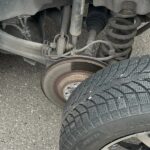Wondering, “How Much Are Junk Cars Worth?” You’re not alone. Many car owners find themselves asking this question when faced with a vehicle that’s reached the end of its road. In 2025, understanding the value of your junk car is crucial before you decide to sell. The price of junk cars can vary significantly, and knowing the factors involved can help you get the best possible offer.
Current estimates suggest that junk car prices in 2025 typically range from $100 to $500, but this is just an average. Depending on various elements, you might receive as little as $50 or potentially upwards of $3,000 for newer or larger vehicles. While some might hope to junk a car for $500, achieving this price isn’t always guaranteed and depends heavily on specific circumstances.
Navigating the process of selling a junk car can feel overwhelming, especially when determining its true worth. Unlike selling a used car in good condition, valuing a junk car involves different considerations. There isn’t a simple formula, but most reputable salvage companies base their appraisals on a common set of factors. These key elements determine what companies will ultimately pay for your junk car.
Let’s delve into the primary factors that influence how much your junk car is worth:
Key Factors Determining Junk Car Value
Several elements come into play when determining the value of your junk car. Understanding these factors will give you a clearer picture of what to expect when you decide to sell.
1. Location of the Vehicle
Where your vehicle is located plays a surprisingly significant role in its junk car value. Your proximity to salvage yards and the regional scrap metal prices directly impact the offers you’ll receive. Areas with higher scrap metal prices or a greater demand for specific car parts will generally yield better payouts. Furthermore, the popularity of certain vehicle models in your region can also influence prices, as local junkyards might be willing to pay more for models with readily available parts demand in their area.
2. Year, Make, and Model
The year, make, and model of your junk car are crucial determinants of its value. While older vehicles are common on the road, the demand for their parts isn’t always consistent. For instance, while some older models may still have a following, the parts demand might be low if those vehicles are generally considered at the end of their lifespan.
Consider also how car manufacturing evolves. As vehicles become more fuel-efficient and environmentally conscious, there’s an increasing use of lighter materials like plastic in car bodies, reducing the overall metal weight. This shift can affect the scrap metal value, particularly for newer junk cars compared to older, heavier models.
3. Condition of the Vehicle
The condition of your junk car is a straightforward factor. A junk car that is cleaner, less damaged, and has more usable parts will naturally fetch a higher price. If your vehicle is still in relatively good condition, even if it’s no longer roadworthy, you’re likely to get a better offer. Conversely, a heavily rusted or severely damaged “clunker” will primarily be valued for its scrap metal content, resulting in a lower payout.
4. Current Scrap Metal Prices
Perhaps the most significant factor influencing junk car prices is the current price of scrap metal. Most salvage companies primarily purchase junk vehicles for their metal content rather than the value of individual parts. Fluctuations in scrap metal prices directly impact what these companies can offer. When scrap prices are low, payouts for junk cars generally decrease, even for vehicles in relatively good condition. Staying informed about current scrap metal prices can give you leverage when negotiating the value of your junk car.
5. The Catalytic Converter
A catalytic converter is a component in your car’s exhaust system that reduces pollutants. These converters contain precious metals like platinum, palladium, and rhodium, making them valuable even when the rest of the car is junk. The presence and condition of the catalytic converter can significantly increase the worth of your junk car. Salvage yards are keenly aware of the value of these converters and factor them into their offers.
Maximizing Your Junk Car Value
While the factors mentioned above are crucial in determining the base value of your junk car, there are steps you can take to potentially maximize your return:
- Research Current Scrap Prices: Understanding the current scrap metal market gives you a better negotiating position. Websites that track scrap metal prices can provide valuable insights.
- Compare Quotes from Multiple Buyers: Don’t settle for the first offer you receive. Contact multiple junk car buyers and salvage yards to compare quotes. Online tools and directories can help you find potential buyers in your area.
- Be Honest About Your Car’s Condition: Accurate descriptions of your vehicle’s condition will lead to more realistic and reliable quotes. Highlight any parts that are still in good working order.
- Remove Personal Belongings: Before selling, thoroughly check your car and remove all personal items. Buyers are only interested in the vehicle itself.
- Have Your Title Ready: A clear title simplifies the selling process and avoids potential complications or delays in payment.
Conclusion: Knowing Your Junk Car’s Worth
Determining “how much are junk cars worth” involves understanding a combination of factors, from location and vehicle specifics to scrap metal prices and the valuable catalytic converter. While the average price for a junk car might fall in the $100 to $500 range, research and preparation can help you secure a better offer. By understanding these elements and taking proactive steps, you can confidently navigate the process of selling your junk car and ensure you receive fair compensation for its value.
If you’re looking to sell your junk car, start by getting an estimate of its worth based on these factors and comparing offers from reputable junk car buyers in your area. This informed approach will empower you to make the best decision and get the most value from your unwanted vehicle.
